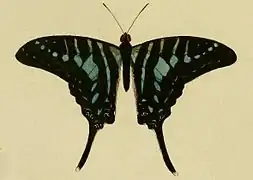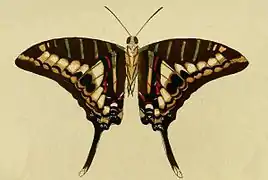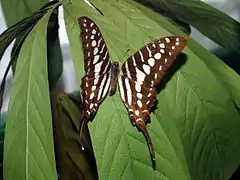Graphium policenes
Graphium policenes, the common swordtail or small striped swordtail, is a species of butterfly in the family Papilionidae (swallowtails). It is found in tropical Africa.[2][3]
| Small striped swordtail | |
|---|---|
.jpg.webp) | |
| Dorsal side | |
_underside.jpg.webp) | |
| Ventral side both in Bobiri Forest, Ghana | |
| Scientific classification | |
| Domain: | Eukaryota |
| Kingdom: | Animalia |
| Phylum: | Arthropoda |
| Class: | Insecta |
| Order: | Lepidoptera |
| Family: | Papilionidae |
| Genus: | Graphium |
| Species: | G. policenes |
| Binomial name | |
| Graphium policenes | |
| Subspecies | |
|
See text | |
| Synonyms | |
| |
The wingspan is 55–60 mm in males and 60–65 mm in females. The species has continuous broods during warmer months.[3]
The larvae feed on Uvaria caffra, Artabotrys monteiroae, Uvaria bukobensis, Uvara chamae, Landolphia buchannani, Landolphia ugandensis, Polyalthia species, Annona reticulata, Annona senegalensis, Annona squamosa, and Monanthotaxis caffra.[2][3]
Subspecies
- Graphium policenes policenes (Sub-Saharan Africa)
- Graphium policenes telloi Hecq, 1999[4] (Nigeria, northern Cameroon, Central African Republic, southern Sudan)
Gallery
 Dorsal view, from Papillions exotiques (1779)
Dorsal view, from Papillions exotiques (1779) Ventral view
Ventral view Mounted specimen, at the Museo Civico di Storia Naturale di Milano
Mounted specimen, at the Museo Civico di Storia Naturale di Milano_puddling.jpg.webp) Puddling
Puddling
Bobiri Forest, Ghana
Similar species
It is very similar to Graphium policenoides and Graphium liponesco [5] It is the nominal member of the policenes -clade (policenes, Graphium liponesco, Graphium biokoensis, Graphium policenoides, Graphium porthaon.)
Taxonomy
Aurivillius in Seitz places policenes (policenoides), nigrescens ,sisenna (polistratus), polistratus, junodi, porthaon and collona in the Policenes Group Subgroup 2 circumscribed Hindwing with a long, narrow tail of uniform width at vein 4. Frons black with white lateral margins. Wings above with green or greenish white markings. Cell of the forewing with 5 — 6 transverse bands or spots. Both wings with submarginal spots. Hindwing beneath with a so-called ornamental band, formed of red spots. Besides the markings already mentioned the forewing has a spot at the base of cellules 1 a and 1 b, an oblique transverse streak in the basal part of these cellules and 8 discal spots, one each in cellules 1 a — 6 and 8; the hindwing has a narrow transverse band at the base, a narrow median band which consists only of three spots (in the cell and in cellules 2 and 7) and usually also 7 discal spots in cellules 1 c -7, of 'which, however, that in 1 c is red. The larva has four pairs of spines, one pair each on the 1., 2., 3. and penultimate segments. The pupa is very angularly widened at the beginning of the abdomen and has a long hump on the mesothorax. Subgroup 2.The apical fourth of the cell of the hindwing above unicolorous black without light spot. The cell of the forewing with a light spot or dot at the costal margin close before the apex. [6]
References
- Cramer, P. [1775-1776]. De Uitlandsche Kapellen voorkomende in de drie waereld-deelen Asia, Africa en America. Amsteldam & Utrecht. 1: [vi], xxx, 16 pp., 155 pp. .
- Graphium, funet.fi
- Woodhall, Steve (2005). Field Guide to Butterflies of South Africa. Cape Town, South Africa: Struik. ISBN 978-1-86872-724-7.
- Hecq , J. 1999 A propos de Graphium policenes; nouveau taxon (Lepidoptera Papilionidae). Lambillionea 99 (4): 517-518
- Larsen, T.B. , 1994 Graphium policenes (Cramer, 1775), Graphium policenoides (Holland, 1892), and Graphium liponesco (Suffert, 1904) three closely related taxa (Lepidoptera; Papilionidae) Lambillionea. Juin; 942: 148-156 (Tome I)
- Aurivillius, [P.O.]C. 1908-1924. In: Seitz, A. Die Großschmetterlinge der Erde Band 13: Abt. 2, Die exotischen Großschmetterlinge, Die afrikanischen Tagfalter, 1925, 613 Seiten, 80 Tafeln (The Macrolepidoptera of the World 13).Alfred Kernen Verlag, Stuttgart.
 This article incorporates text from this source, which is in the public domain.
This article incorporates text from this source, which is in the public domain.
- Carcasson, R.H. 1960 The Swallowtail Butterflies of East Africa (Lepidoptera, Papilionidae). Journal of the East Africa Natural History Society pdf Key to East Africa members of the species group, diagnostic and other notes and figures. (Permission to host granted by The East Africa Natural History Society)
![]() Data related to Graphium policenes at Wikispecies
Data related to Graphium policenes at Wikispecies